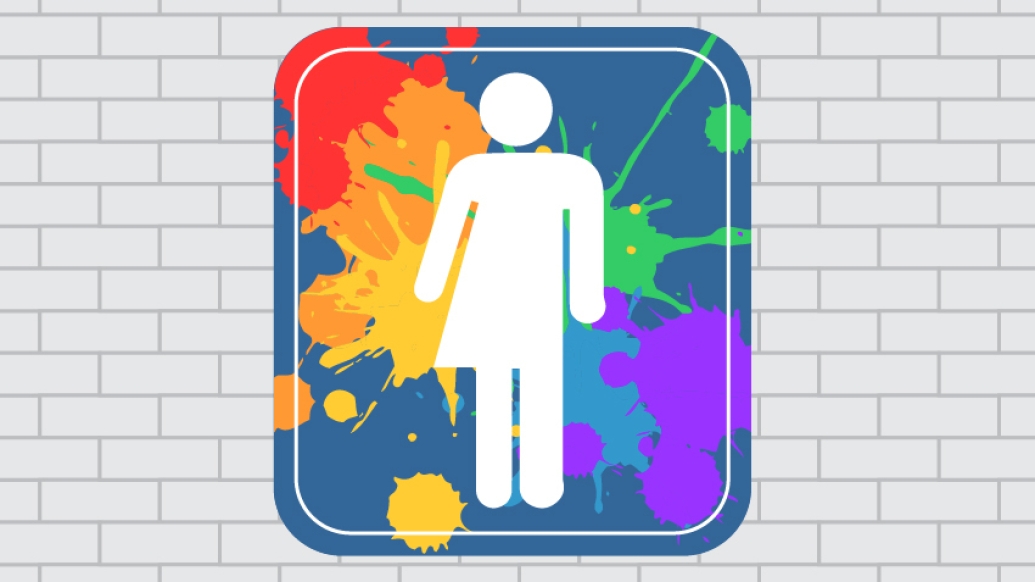Transgender rights continue to be under threat in several states, but a new study reveals that young people’s views may conflict with older Americans when it comes to bathroom policies affecting transgender individuals.
8:03 AM
Author |

Young people clash with older adults when it comes to bathroom policies related to gender identity, a new University of Michigan study suggests.
As an increasing number of "bathroom bills" are debated around the country, eight in 10 young people aged 14-24 years polled (79%), say that bathroom use by transgender people should not be restricted, according to the findings in the Journal of Homosexuality.
LISTEN UP: Add the new Michigan Medicine News Break to your Alexa-enabled device, or subscribe to our daily updates on iTunes, Google Play and Stitcher.
The findings are in sharp contrast to a recent Gallup poll that surveyed 1,017 Americans ages 18 and over which found that about half (51%) of surveyed adults think transgender individuals should use the bathroom that correlates with the gender they were assigned at birth.
Michigan researchers analyzed data from 683 respondents of a weekly text messaging survey, "MyVoice," which includes youth from across the U.S., but predominately from Southeast Michigan.
"Contrary to current policy in many schools, the young people we polled do not support restrictions on bathroom use by transgender people," says lead author Halley Crissman, M.D., M.P.H., an obstetrician gynecologist at the U-M Von Voigtlander Women's Hospital.
"The majority of respondents believe bathroom use is a personal and private decision and a matter of equality, freedom and human rights. This suggests that young people's views on bathroom use by transgender individuals differ from the narratives often represented in public debates."
Young people in support of the right of transgender people to use the bathroom they feel most comfortable with also said that transgender people are not sexual predators, and that forcing them to use particular bathrooms may put transgender people at risk.
Clashing views
Crissman says researchers decided to explore the issue based on previous data suggesting that as a whole, young people may be becoming more accepting of people who are transgender.
"The adult dialogue we hear in the media often includes a lot of fear and guesswork about how this issue may impact children in schools," she says.
"We wanted to tap into the beliefs, experiences and voices of youth surrounding current policies. Youth are the ones most impacted by school policies and they are also upcoming voters."
An estimated 150,000 13-24 year olds in the U.S. identify as transgender, previous data suggests. Nearly 60 percent of transgender youth say they have been required to use the restroom corresponding with the gender they were assigned at birth, and 70 percent report avoiding public bathrooms because of feeling unsafe and uncomfortable.
Peer support
Crissman says that research shows that transgender youth who grow up in social situations where they feel supported in their gender identity have improved mental health outcomes—including rates of depression similar to those of non-transgender youth.
Given that social support impacts the mental health outcomes of transgender youth, experts say peer support is likely an important factor.
MORE FROM MICHIGAN: Sign up for our weekly newsletter
"If there is indeed peer support among youth for allowing transgender individuals to use bathrooms that match their gender identity – as our study suggests – there may be profound positive implications for upcoming generations of transgender youth," Crissman says.
"Children spend a lot of time in school every day with peers— peer support really matters and has the potential to significantly impact the well-being of transgender youth."
Even the tone of discussions around current policies in the news could influence psychological stress experienced by people who are transgender.
Says Crissman: "While transgender youth continue to face harassment at levels far beyond peers, the school environment may gradually be becoming a less hostile space for these students."

Explore a variety of healthcare news & stories by visiting the Health Lab home page for more articles.

Department of Communication at Michigan Medicine
Want top health & research news weekly? Sign up for Health Lab’s newsletters today!





